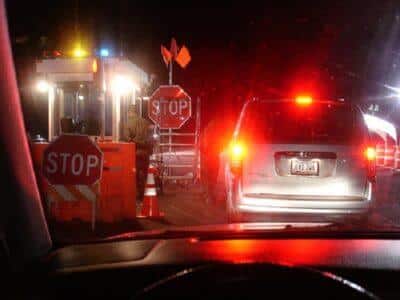A trucker claims that the US Border Patrol arrested and jailed him for 19 days because he simply stood up for his constitutional rights.
The man, Greg Rosenberg, also alleges that he was held without charges because he questioned the Border Patrol’s authority to stop him 29 miles inside the United States. Significantly, he was not at a border.
“I said ‘I’m a libertarian, I’m a principled person, I don’t like government’s actions but I like you guys.’ … They hated me for that,” Rosenberg told Reason TV. “So they arrested me for what I look like but they pressed charges because of my beliefs.”
Rosenberg, who speaks with an accent, came to the US 10 years ago from Armenia, and his family’s history of living under Soviet rule greatly impacted his political beliefs.
“Back then [in Soviet-controlled Armenia], if you complained about the government, they took you to Siberia,” he said.
He was stopped and arrested at a Border Patrol Checkpoint on Interstate 35 near Laredo, Texas, nearly 30 miles north of the border. He was riding a semi-tractor that was hauling Xerox machines from Mexico to Dallas when the vehicle entered the checkpoint late at night.
Discover The Only Way Back To True Freedom And Liberty In America…
He recorded the entire sequence and border patrol agents deleted the video, but he was able to use software to recover some of it.
‘No, This Is Not The US Border’
The conflict started when an immigration officer asked if Rosenberg and his friend were US citizens. When Rosenberg said he did not have to answer the question, a video he shot shows that the Border Patrol officers became belligerent.
“No, this is not the US Border, this is inside the United States,” Rosenberg said. The agents responded that a US Supreme Court ruling called United States vs. Martinez-Fuerte gave them the right to stop and question travelers within US borders.
Rosenberg’s attorney, Prerna Lal, contends that the Border Patrol violated that decision because agents had no probable cause to stop and arrest Rosenberg. The court ruled that the Border Patrol has a right to stop vehicles and question occupants on highways near the border but can only search the vehicles if they have a probable cause for the search.
The federal government has refused to comment on Rosenberg and Lal’s allegations.
Was He Arrested for Talking About the Constitution?
“I could never imagine challenging government’s actions, talking about the Constitution, you know, about your rights could get you arrested,” Rosenberg said.
The video shows that six Border Patrol agents dragged Rosenberg from the truck and handcuffed him after he mentioned the Constitution. Rosenberg’s allegations of what happened next are particularly disturbing.
The story continues below the video:
The agents detained Rosenberg and held him even after they discovered he was a citizen. Rosenberg said agents mocked him and laughed at him when he talked about his rights.
“They probably would let me go if I just bowed down,” Rosenberg said. “Basically, they were saying [they’d let me go] if I would agree I am wrong, that I would never do it again, that I would apologize, you know, give up my values … never again come back to the checkpoints.”
False Imprisonment
Rosenberg said he was booked for “impeding Border Patrol duties” after he refused to apologize.
Rosenberg was held for 19 days and did not see his lawyer for two weeks. On Oct. 10, 2014, the US Attorney dropped all the charges and Rosenberg was released.
“The problem is that the government dropped charges because there is no case against Greg,” Lal said. “There is no evidence that he resisted arrest. He didn’t do that. The fact that he spent 19 days in jail is a violation of his rights and is false imprisonment.”
Lal has sued the government for violating Rosenberg’s Fourth Amendment rights. Lal contends the agents violated the Fourth Amendment’s ban on unreasonable searches and seizures when they stopped and arrested Rosenberg.
Constitution-Free Zone
Rosenberg’s case seems to justify the American Civil Liberties Union’s (ACLU) allegation that the federal government has effectively made all areas within 100 miles of a US border a “Constitution-Free Zone.”
“Today I see a lot of similarities about the stories that my parents told me about the past,” Rosenberg said. “If you complained about the government you were taken to Siberia. You don’t have the right here to legally challenge the government.”
Should Rosenberg have cooperated with the agents? Or should they have let him go? Share your thoughts in the section below:
 Off The Grid News Better Ideas For Off The Grid Living
Off The Grid News Better Ideas For Off The Grid Living




